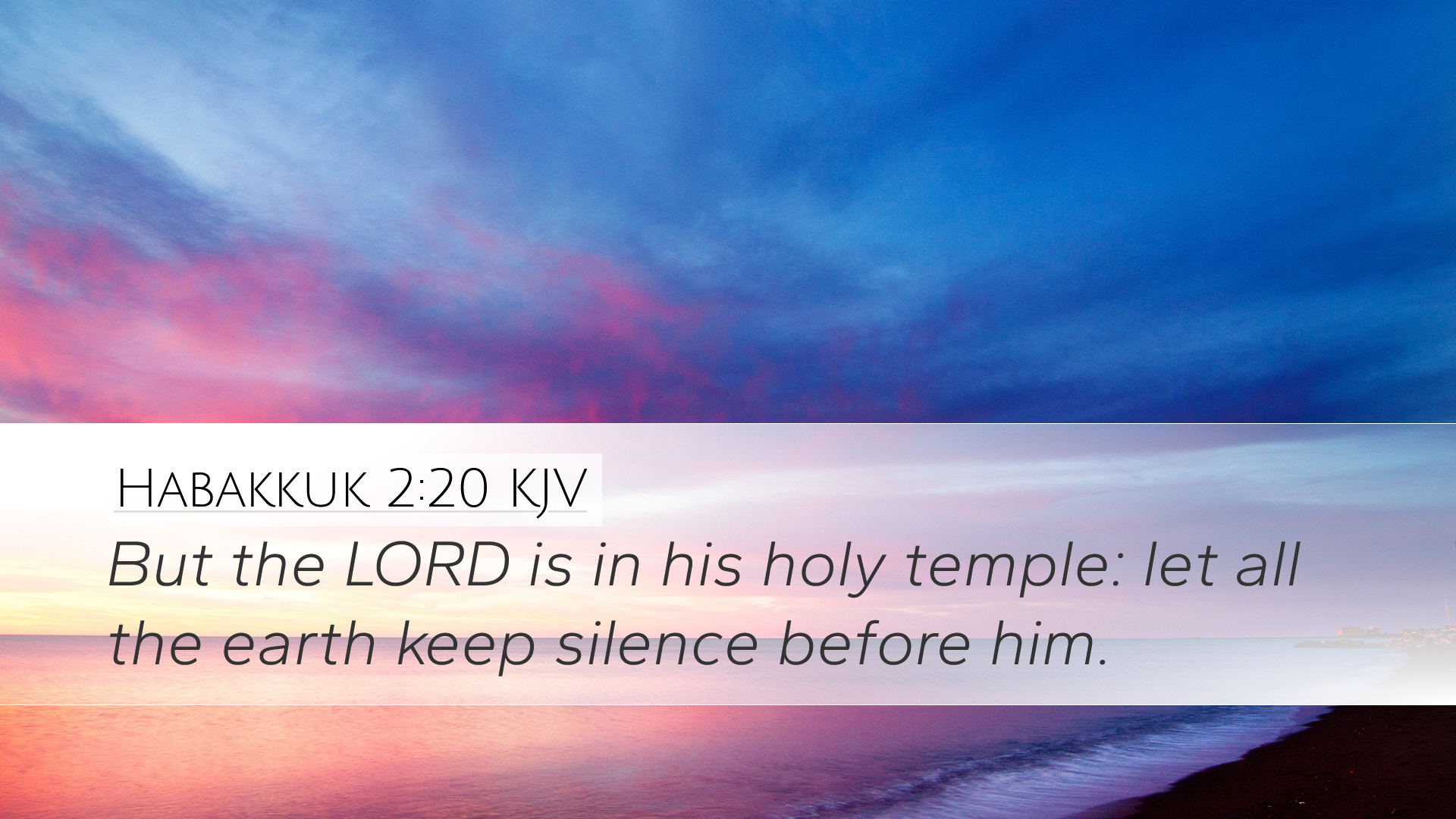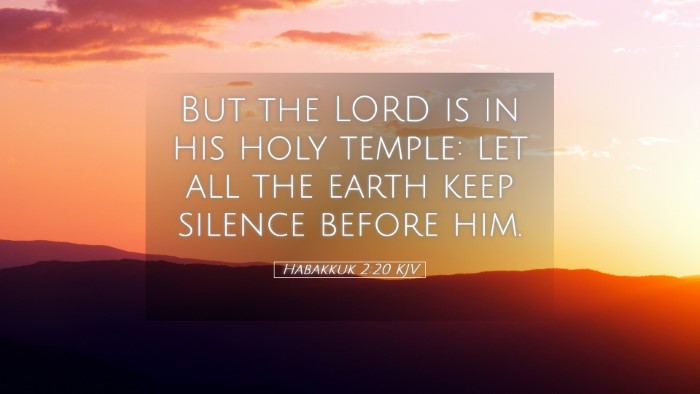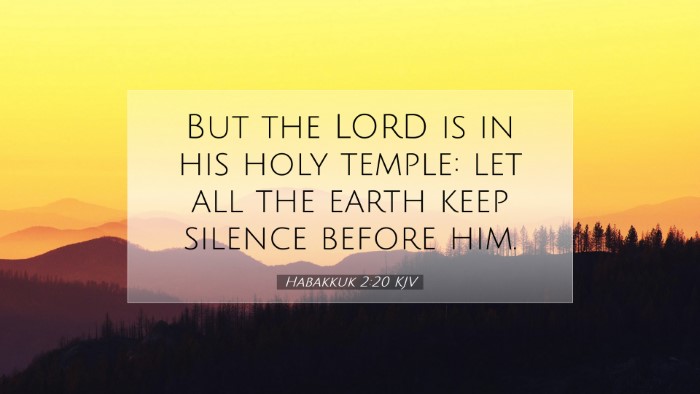Old Testament
Genesis Exodus Leviticus Numbers Deuteronomy Joshua Judges Ruth 1 Samuel 2 Samuel 1 Kings 2 Kings 1 Chronicles 2 Chronicles Ezra Nehemiah Esther Job Psalms Proverbs Ecclesiastes Song of Solomon Isaiah Jeremiah Lamentations Ezekiel Daniel Hosea Joel Amos Obadiah Jonah Micah Nahum Habakkuk Zephaniah Haggai Zechariah MalachiHabakkuk 2:20
Habakkuk 2:20 KJV
But the LORD is in his holy temple: let all the earth keep silence before him.
Habakkuk 2:20 Bible Commentary
Commentary on Habakkuk 2:20
Bible Verse: "But the Lord is in his holy temple: let all the earth keep silence before him." (Habakkuk 2:20, KJV)
Introduction
The verse from Habakkuk 2:20 serves as a closing declaration in the second chapter of this profound prophetic book. It encapsulates a moment of divine authority and the appropriate human response to God's presence. As we delve into the commentaries of significant theologians such as Matthew Henry, Albert Barnes, and Adam Clarke, we will explore the implications of this verse for pastors, students, theologians, and scholars.
Contextual Analysis
Before we examine the verse itself, it is essential to understand its context within the book of Habakkuk. This prophetic book is a dialogue between the prophet Habakkuk and God, addressing the injustice in Judah and the coming Babylonian invasion. The prophet's struggle and God's forthcoming judgment frame this statement of reverence and silence before the Lord.
The Lord's Sovereignty
1. The Assurance of God’s Presence
Matthew Henry emphasizes the significance of "the Lord is in His holy temple." This serves as a reminder to the people of Israel and to us today about the omnipresence and sovereignty of God, even amidst chaos and wrongdoing. Habakkuk reassures both himself and the audience that God is still in control, seated in His temple, ruling over the nations.
- Significance of the Temple: The term "temple" symbolizes the dwelling place of God, suggesting that His presence brings order and holiness. This forms a counterpoint to the prevailing injustice and sinfulness in society.
- Divine Authority: The reference to God's temple indicates His divine authority, which is not diminished by human affairs. This evokes reverence and necessitates human silence.
A Call to Reverence
2. The Response of Silence
Adam Clarke notes that the directive to "keep silence before Him" emphasizes the appropriate attitude towards God’s holiness and majesty. In a world filled with noise—literal and metaphorical—this call to silence is significant.
- Humility and Awe: Silence in this context signifies humility and a recognition of God’s infinite greatness compared to human frailty. It is an acknowledgment that God’s ways and thoughts are higher than ours (Isaiah 55:8-9).
- Attentiveness: Keeping silence also suggests being attentive to God’s voice, allowing Him to speak without the distractions of our own agendas.
Implications for Today
3. Relevance to Contemporary Believers
Albert Barnes illuminates how this verse applies to modern readers, urging us to cultivate a spirit of silence and reverence in our worship and daily lives. In an age dominated by chatter and distractions, this call to reflect on God’s holiness is particularly poignant.
- Worship and Reverence: The verse encourages individuals and congregations to restore a sense of sacredness in worship. In silence, we can better perceive God's presence and address the condition of our hearts.
- Social Justice and Divine Judgment: For those grappling with societal injustices, this verse is a reminder that God is aware, and the final accountability lies with Him. The silence also symbolizes trust in God's timing for judgment and justice.
Theological Reflection
4. The Nature of God’s Presence
This verse invites theological reflection on the nature of God's presence. While God is sovereign, He is also approachable, paralleling the tension between His transcendence and immanence. Habakkuk encourages us to recognize both aspects in our relationship with God.
- God’s Holiness: The holiness of God necessitates awe and reverence. This reflects the theological principle that encountering God should lead to a profound sense of respect and obligation.
- Human Responsibility: The silence we are called to maintain does not imply passivity; rather, it involves active listening and submission. It is crucial for individuals and communities to cultivate practices that deepen this engagement with God.
Conclusion
In conclusion, Habakkuk 2:20 encapsulates a powerful message about God's sovereign authority and the essential human response of silence and reverence. The insights provided by Matthew Henry, Adam Clarke, and Albert Barnes enrich our understanding of this text, encouraging us to embrace a posture of humility before God. As we reflect on this verse, may we be reminded of God's unwavering presence and cultivate practices that honor Him in our lives and communities.


